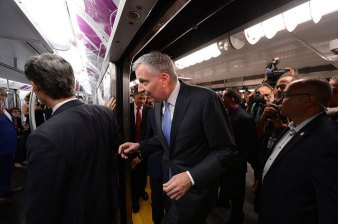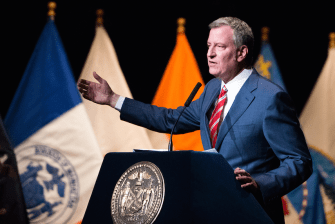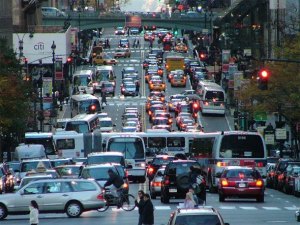Bernie Sanders Throws His Weight Behind de Blasio’s Hollow Transit Populism
"Our Revolution" won't overturn the status quo of free driving privileges, available to the car-owning class, which clogs streets and slows down bus service in NYC.

On the hunt for progressive cred heading in to a general election he’s expected to win running away, Mayor de Blasio enlisted Senator Bernie Sanders, who represents one of the least urban states in the union, to vouch for his transit plan earlier today. The mayor got a withering quote from Sanders about congestion pricing in the bargain.
At a press conference at Fulton Center in Lower Manhattan, Sanders praised the mayor as “one of the great progressive leaders of the United States,” endorsed his “millionaire’s tax” to fund the MTA, and worried that congestion pricing would tax “working families and working people.” The senator apparently hasn’t given much thought to the ways working New Yorkers are already taxed by free driving privileges available only to the car-owning class.
Sanders was responding to a reporter’s question about congestion pricing. “I think that at a time of massive income and wealth inequality, you don’t want to be taxing working families and working people who might have an automobile and be traveling in the city,” he said. He admitted that he was not familiar with “all of the details,” then compared the potential impact of bridge tolls to a gas tax hike on working class Vermonters with long commutes.
But there are some big differences between New York City and the state that Sanders represents. In New York, working people ride transit, and hundreds of thousand of bus passengers get bogged down in traffic congestion every day — something the small cities in Sanders’ home state simply don’t have to cope with. The number of daily bus riders in New York City is far larger than the entire population of Vermont.
In Vermont, 83 percent of all workers commute in a car, according to 2016 Census Bureau data; in New York City, the figure is just 21 percent. And in Vermont, more than half of commuters living below the federal poverty line commute by personal automobile, while only 2 percent of poor New Yorkers commute via car into Manhattan every day, according to an analysis released last week by the Community Service Society.
There are inequities in NYC’s transportation system that just don’t register in the de Blasio/Sanders populist framework. Relatively affluent car owners can access the city’s busiest neighborhoods for free, while millions of carless residents have to pay a transit fare, and many of them get stuck in traffic on the city’s slowest-in-the-nation bus fleet.
In Sanders’ defense, he’s just passing through. What’s de Blasio’s excuse?




